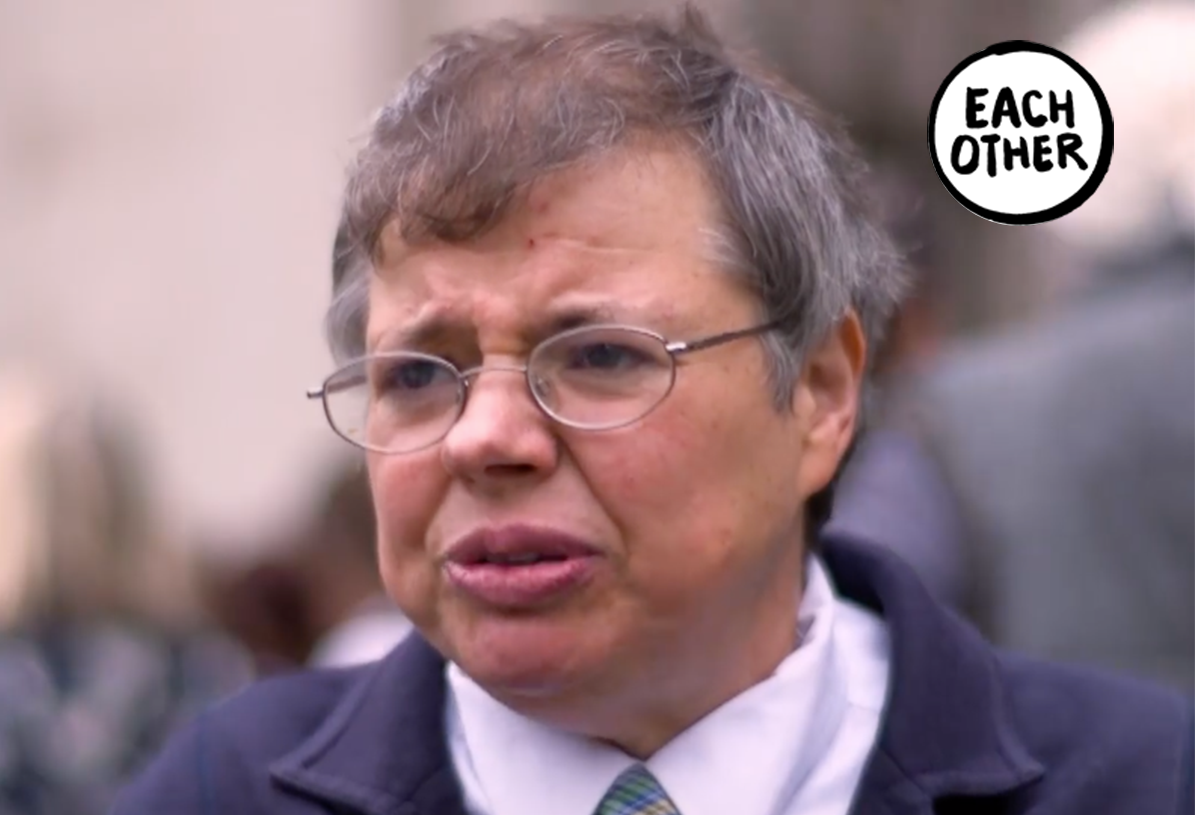Segregation, education, and staying true to your principles when everyone is against you. These were among the issues on the mind of disability campaigner Simone Aspis as she answered EachOther’s big questions.
Simone has been campaigning for the human rights of people with disabilities for more than 25 years, fuelled by the sense of injustice she felt growing up without the opportunities that her non-disabled peers enjoyed.
She is the director of Changing Perspectives, a campaign calling for an end to the practice of locking people with autism or learning disabilities in mental health hospitals indefinitely.
Last month, a cross party group of MPs said the practice is a breaching peoples’ human rights and called for urgent reform.
Simone also leads Allfie – the Alliance for Inclusive Education – which seeks to ensure those with special educational needs are not “shut out” from mainstream education.
Describe what you do in 15 words or less.
Campaigning to get people with learning disabilities or autistic spectrum conditions out of institutions.
What is the most important lesson you learned while growing up?
Staying firm and principled about what one believes is right and needs changing, even when everyone is against you. Speaking the truth and being passionate will always prevail in whatever you do.
What advice would you give a ten-year-old you?
To take direct action and stay put in my own home until someone got the message that I did not want to attend the school that I hated.
What are you most proud of?
Overseeing the People First campaign to ensure that people with learning difficulties were included in the first anti-disability discrimination legislation, the Disability Discrimination Act (DDA).
We launched an easy-read version of anti-discrimination legislation we wanted to be passed by parliament. This was used by former Labour MP Harry Barnes at the despatch box to ask the government about making their laws in easy read format. The DDA was the first piece of legislation published in easy-to-read way by any government.
Is there anything you would like to achieve which you haven’t yet?
Yes – the full incorporation of the United Nations Convention on the Rights of Persons with Disabilities (CRPD) into UK legislation. This will allow domestic laws to be deemed unlawful if they are incompatible with any of the Convention’s articles.
[This Convention, ratified by the UK in 2009, sets out in greater detail what existing human rights protections mean for people with disabilities. It also places obligations on the government to take active steps to ensure people with disabilities’ human rights are upheld.]
If you could immediately put right one injustice in the UK right now – which would it be? Why?
The state’s power to detain disabled people on the grounds of disability in psychiatric hospitals and Assessment Treatment Units (ATUs) under the Mental Health Act and Mental Capacity Act.
“Mental disorder” and “mental capacity” are both socially constructed ideas which are open to abuse by those in power.
Who decides who has the right to be in or out of society? Who has the right to say who should be detained in institutions because their cognitive, emotional, and sensory functioning does not conform to western ideas?
Which human right the most important to you? Why?
The right to life – there is little point in talking about anything else unless we as disabled people have the right to life.
Our right to life is under attack with non-invasive prenatal testing (NIPT) for Down’s syndrome, genetic screening and genetic engineering there is increasing pressure on society to terminate pregnancy of disabled babies.
Further, disabled people with life-threatening and time-limiting conditions are routinely being denied access to drugs and other health care.
Disabled People’s right to life is being treated by toxic anti-psychotic medication that can be prescribed without patient consent when detained under the Mental Health Act or Mental Capacity Amendment Act.
Do you have any ideas about what should be done to help heal the divisions in society right now?
We need to start through education, developing a fully inclusive education system.
It’s no accident that there is increasing antisemitism, Islamophobia, ableism and other isms when growing numbers of Jewish, Muslim and disabled children – among others on the margins of society – are being educated in faith-based special schools and other types of segregated schools.
Segregation breeds ignorance, prejudice, fear and intolerance towards difference and diversity. Inclusive education allows for children to play, learn, work and relate together with the aim of creating a more understanding and tolerate society.
Education has a role in teaching and challenging ideas and oppression while being creative on how our services, products and facilities can be inclusive whilst legislation and policies are used as vehicles for developing a humane, caring and just society.







